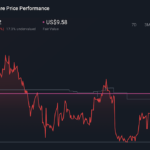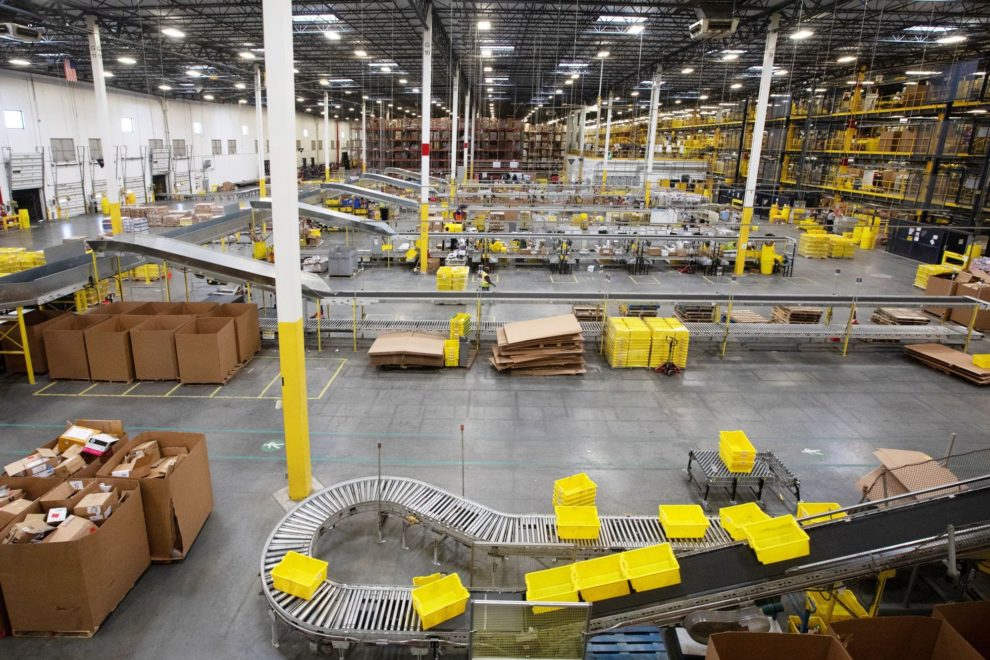
(Bloomberg) — Amazon.com Inc., Instacart Inc. and other companies providing food, medicine and other essentials are about to find out whether the pandemic can accomplish what organized labor has struggled to do: give employees and contractors the leverage to extract better working conditions.
Some employees at Amazon’s Staten Island, New York, warehouse walked off the job on Monday, calling for the company to shut the facility for extended cleaning after they say a number of their colleagues were diagnosed with Covid-19. Instacart workers called for a nationwide strike on Monday over safety and pay concerns. And, if a petition circulating online gets traction, workers at Amazon-owned Whole Foods Market plan to call in sick en masse on Tuesday.
As coronavirus cases pop up at warehouses and supermarkets, workers — cheered on by politicians and labor activists — have begun demanding better pay, sick leave and on-the-job protections from the deadly respiratory virus. Amazon, the second-largest private employer in the U.S., has long been the target of efforts to organize its workforce. They have generally failed.
“These things do sometimes take on a life of their own, and I wonder if we’re in one of those moments where workers are starting to stand up in greater and greater numbers because of the magnitude of the threat they’re facing,” said Brishen Rogers, an associate law professor at Temple University.
Organizers face long odds should they pursue formal unionization. Forming unions in the U.S. is difficult, and the coronavirus has both flooded the market with potential new hires and made large labor rallies impractical. Organizers of the Staten Island walkout say more than 60 employees participated; video from a protest appeared to show a sparser crowd.
“You could come out of this seeing much greater levels of worker organization within Whole Foods and Amazon that could in the future grow into formal unions,” Rogers said. In the meantime, “I think they’ll respond by changing policies, in part to avoid unionization.”
In an emailed statement, Amazon said 15 people out of a workforce of 5,000 participated in the Staten Island demonstration, and called their critiques “completely unfounded.”
“Our employees are heroes fighting for their communities and helping people get critical items they need in this crisis,” the company said. “Like all businesses grappling with the ongoing coronavirus pandemic, we are working hard to keep employees safe while serving communities and the most vulnerable.” Amazon says it has stepped up cleaning inside its facilities, and that it is supporting employees diagnosed with Covid-19.
Instacart said it has seen “absolutely no impact” from the strike and that workers’ earnings are up on average. The company added about 50,000 new workers as so-called Instacart shoppers in the last week, and there were 40% more people working on Monday compared with the same day last year, the company said. “Our goal is to offer a safe and flexible earnings opportunity to shoppers, while also proactively taking the appropriate measures to operate safely,” a spokeswoman for Instacart wrote in an email.
A Whole Foods spokeswoman said the grocer is “committed to prioritizing our team members’ well-being, while recognizing their extraordinary dedication.” Despite the walkout and threatened sick-out at Whole Foods, Amazon shares climbed 3.4% Monday, closing at $1,963.95, alongside market-wide gains in the U.S.
Worker protests over coronavirus workplace conditions have also recently hit companies like Perdue Farms, McDonald’s Corp. and General Electric Co., where employees at a Massachusetts site Monday protested — standing six feet apart — to demand the company deploy workers to manufacture ventilators in-house.
Amazon boosted its $15 an hour starting pay in the U.S. by $2 an hour through the end of April, and raised overtime pay. Workers at an Amazon warehouse in northern Italy, the epicenter of Europe’s coronavirus outbreak, on Friday said they’d reached an agreement that guaranteed workers an additional five minute break to help practice personal hygiene, and made permanent temporary enhanced cleaning protocols rolled out during the pandemic.
It remains to be seen whether Amazon will be pushed into broader concessions for the workers who pack and ship packages to customers. The U.S. labor market is teeming with millions of newly unemployed workers as large portions of the economy shut down to prevent the spread of the virus. Amazon has said it hopes to hire an additional 100,000 workers to deal with a surge in online shopping by people asked to stay home. Wholesale closings of large chunks of Amazon’s logistics network seem unlikely, say people who follow the company.
Amazon’s responses to worker agita have been rolled out in piecemeal fashion over the last two weeks. When the first coronavirus cases appeared in European warehouses, the company began doing things like removing chairs from break rooms and turning off the metal detectors employees were previously asked to go through on their way out of buildings. Over the weekend, Amazon said it would begin screening some employees in the Seattle and New York areas for fevers, a program Amazon plans to roll out at sites nationwide.
In the U.S., Amazon has also reoriented some work to spread out employees and closed locker rooms. Still several employees who work at facilities across the country have expressed alarm at the decision to keep some facilities with confirmed coronavirus cases open. The only Amazon warehouse known to have closed for an extended period — a warehouse in Shepherdsville, Kentucky — was set to reopen last week before the state governor intervened.
Amazon says it follows public health recommendations for cleaning its sites, and that it reviews video footage to determine who sick employees came into extended contact with. Those workers are asked to go home and into a 14-day quarantine.
Amazon has promised two weeks of sick pay to all employees diagnosed with Covid-19 or ordered into a quarantine; some workers, and a group of U.S. senators, say that’s insufficient.
Emboldened workers can expect consumers to back them if they don’t think companies are protecting their health, said Nelson Lichtenstein, a history professor at the University of California at Santa Barbara. “Here’s a crisis,” he said, “which makes it absolutely clear how important they are.”
(Updates with Instacart reporting in the ninth paragraph.)
<p class="canvas-atom canvas-text Mb(1.0em) Mb(0)–sm Mt(0.8em)–sm" type="text" content="For more articles like this, please visit us at bloomberg.com” data-reactid=”68″>For more articles like this, please visit us at bloomberg.com
<p class="canvas-atom canvas-text Mb(1.0em) Mb(0)–sm Mt(0.8em)–sm" type="text" content="Subscribe now to stay ahead with the most trusted business news source.” data-reactid=”69″>Subscribe now to stay ahead with the most trusted business news source.
©2020 Bloomberg L.P.








